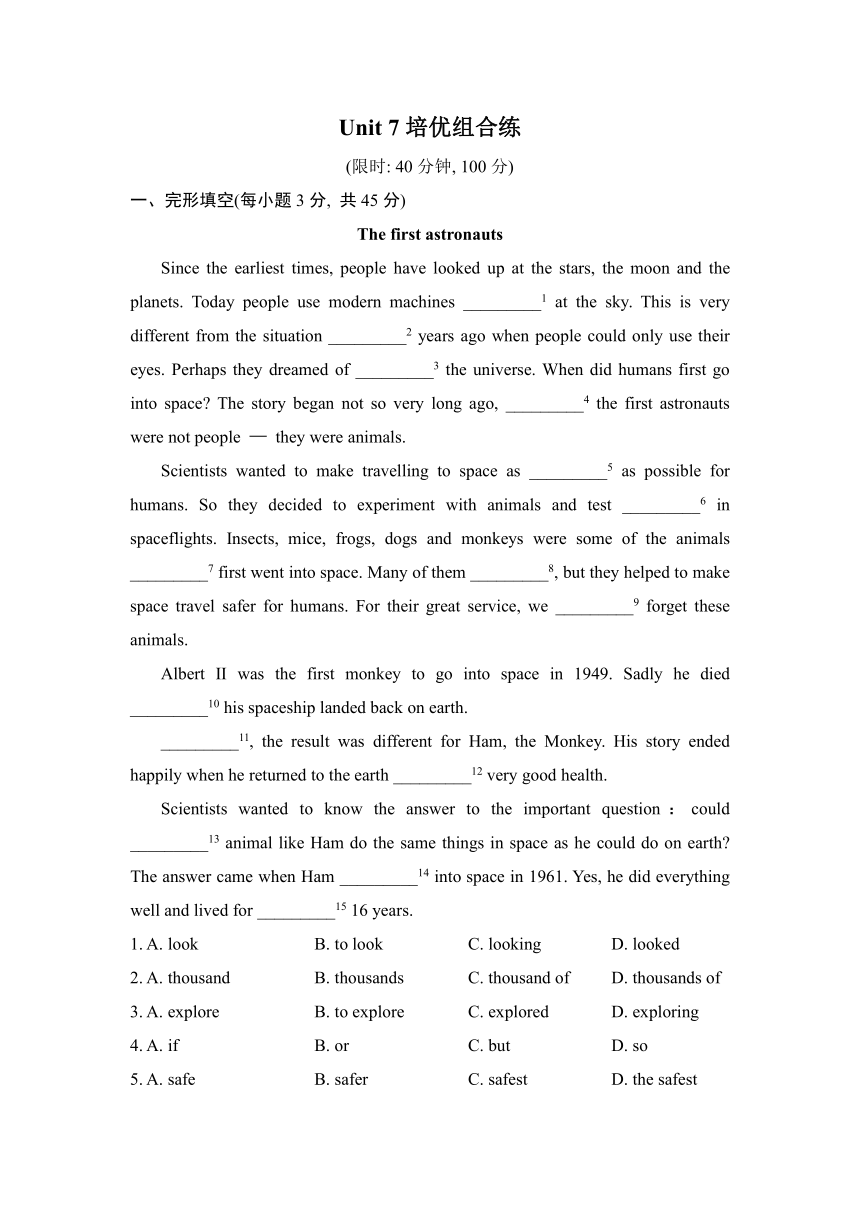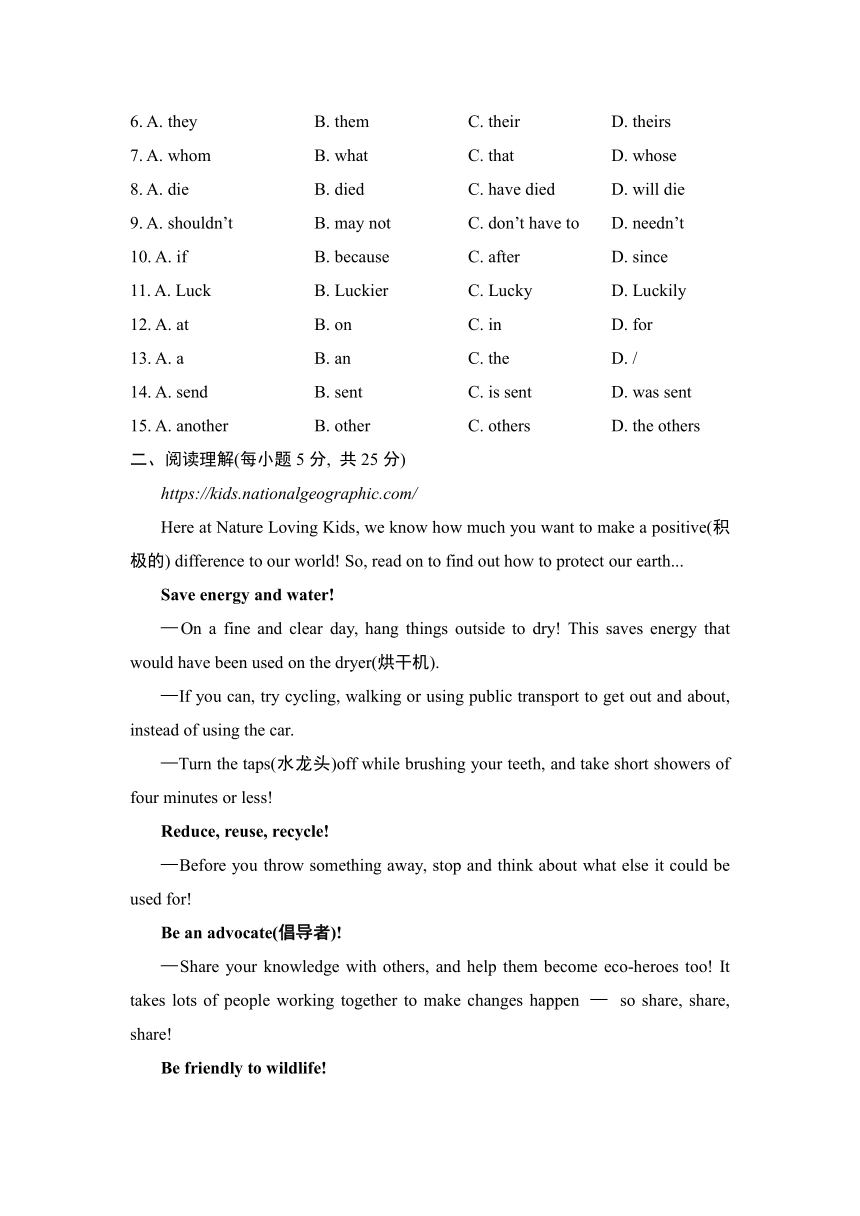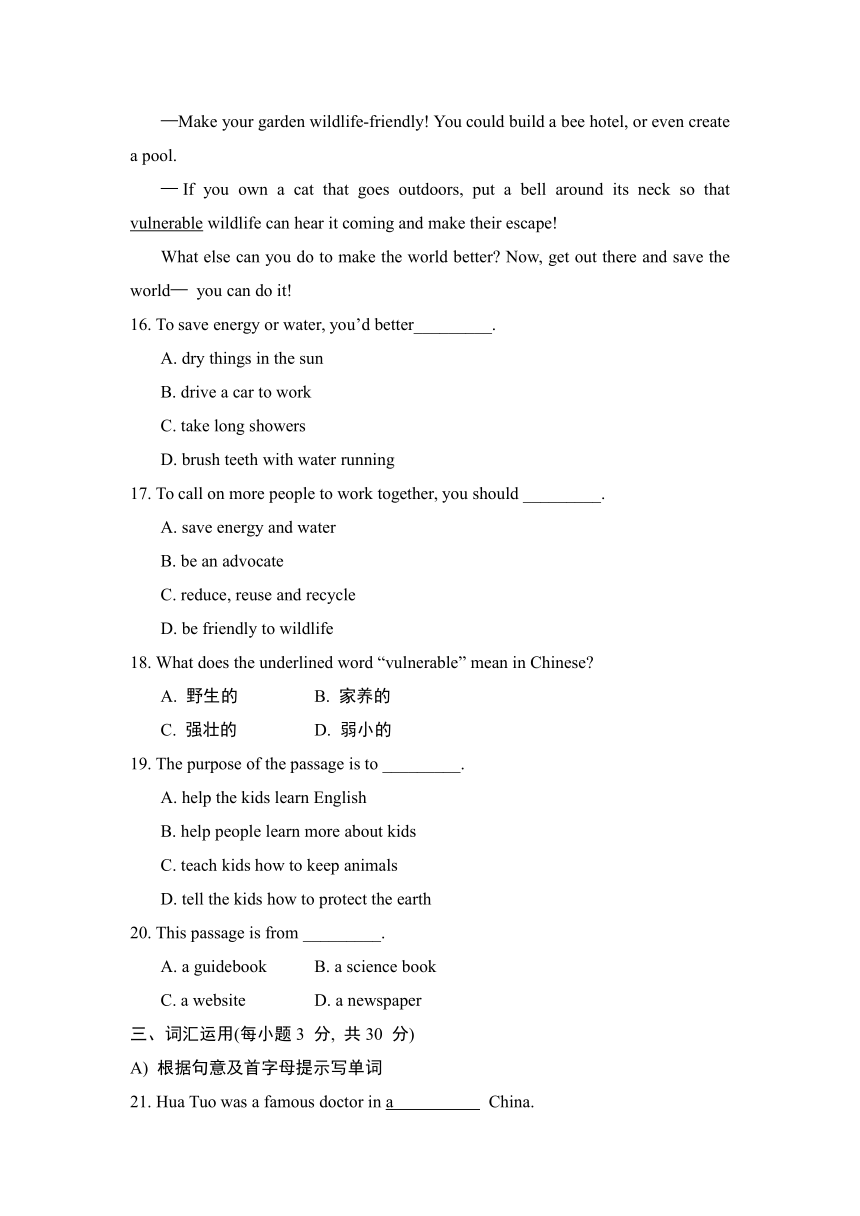Unit 7 What's the highest mountain in the world?培优组合练(含答案)
文档属性
| 名称 | Unit 7 What's the highest mountain in the world?培优组合练(含答案) |  | |
| 格式 | doc | ||
| 文件大小 | 32.5KB | ||
| 资源类型 | 教案 | ||
| 版本资源 | 人教新目标(Go for it)版 | ||
| 科目 | 英语 | ||
| 更新时间 | 2022-01-24 11:13:43 | ||
图片预览



文档简介
Unit 7培优组合练
(限时: 40分钟, 100分)
一、完形填空(每小题3分, 共45分)
The first astronauts
Since the earliest times, people have looked up at the stars, the moon and the planets. Today people use modern machines _________1 at the sky. This is very different from the situation _________2 years ago when people could only use their eyes. Perhaps they dreamed of _________3 the universe. When did humans first go into space The story began not so very long ago, _________4 the first astronauts were not people — they were animals.
Scientists wanted to make travelling to space as _________5 as possible for humans. So they decided to experiment with animals and test _________6 in spaceflights. Insects, mice, frogs, dogs and monkeys were some of the animals _________7 first went into space. Many of them _________8, but they helped to make space travel safer for humans. For their great service, we _________9 forget these animals.
Albert II was the first monkey to go into space in 1949. Sadly he died _________10 his spaceship landed back on earth.
_________11, the result was different for Ham, the Monkey. His story ended happily when he returned to the earth _________12 very good health.
Scientists wanted to know the answer to the important question:could _________13 animal like Ham do the same things in space as he could do on earth The answer came when Ham _________14 into space in 1961. Yes, he did everything well and lived for _________15 16 years.
1. A. look B. to look C. looking D. looked
2. A. thousand B. thousands C. thousand of D. thousands of
3. A. explore B. to explore C. explored D. exploring
4. A. if B. or C. but D. so
5. A. safe B. safer C. safest D. the safest
6. A. they B. them C. their D. theirs
7. A. whom B. what C. that D. whose
8. A. die B. died C. have died D. will die
9. A. shouldn’t B. may not C. don’t have to D. needn’t
10. A. if B. because C. after D. since
11. A. Luck B. Luckier C. Lucky D. Luckily
12. A. at B. on C. in D. for
13. A. a B. an C. the D. /
14. A. send B. sent C. is sent D. was sent
15. A. another B. other C. others D. the others
二、阅读理解(每小题5分, 共25分)
https://kids.nationalgeographic.com/
Here at Nature Loving Kids, we know how much you want to make a positive(积极的) difference to our world! So, read on to find out how to protect our earth...
Save energy and water!
—On a fine and clear day, hang things outside to dry! This saves energy that would have been used on the dryer(烘干机).
—If you can, try cycling, walking or using public transport to get out and about, instead of using the car.
—Turn the taps(水龙头)off while brushing your teeth, and take short showers of four minutes or less!
Reduce, reuse, recycle!
—Before you throw something away, stop and think about what else it could be used for!
Be an advocate(倡导者)!
—Share your knowledge with others, and help them become eco-heroes too! It takes lots of people working together to make changes happen — so share, share, share!
Be friendly to wildlife!
—Make your garden wildlife-friendly! You could build a bee hotel, or even create a pool.
—If you own a cat that goes outdoors, put a bell around its neck so that vulnerable wildlife can hear it coming and make their escape!
What else can you do to make the world better Now, get out there and save the world— you can do it!
16. To save energy or water, you’d better_________.
A. dry things in the sun
B. drive a car to work
C. take long showers
D. brush teeth with water running
17. To call on more people to work together, you should _________.
A. save energy and water
B. be an advocate
C. reduce, reuse and recycle
D. be friendly to wildlife
18. What does the underlined word “vulnerable” mean in Chinese
A. 野生的 B. 家养的
C. 强壮的 D. 弱小的
19. The purpose of the passage is to _________.
A. help the kids learn English
B. help people learn more about kids
C. teach kids how to keep animals
D. tell the kids how to protect the earth
20. This passage is from _________.
A. a guidebook B. a science book
C. a website D. a newspaper
三、词汇运用(每小题3 分, 共30 分)
A) 根据句意及首字母提示写单词
21. Hua Tuo was a famous doctor in a China.
22. There is some d in the northwestern part of China. It’s very dry and few animals can live on it.
23. In winter we must wear t clothes to keep warm.
24. A new r will begin. It is about people’s lives.
25. —What do pandas mainly eat every day
—B .
B)用括号中所给词的适当形式填空
26. I believe you will ___________ (success) in passing the English exam.
27. At ___________ (birthday), a baby panda is only 15 cm long.
28. Some _____________ (achieve)in the medical research helped control the terrible illness.
29. A thin coat gives little ____________ (protect) against the cold.
30. Gina has a serious _____________ (ill), so she can’t go to school.
答案
一、1. B 点拨:句意为“现在人们使用现代的机器来观测天空”。use... to do sth.“使用……做某事”, 动词不定式作目的状语, 故选B。
2. D 点拨:thousand 千, 修饰名词时, 若前面没有具体的数字, 可用thousands of ..., 数以千计的, 故选D。
3. D 点拨:dream of 梦想, of 为介词, 后面跟动词的-ing 形式, 故选D。
4. C 点拨:前半句“(人类第一次进入太空)这个故事发生在不久之前”和后半句“第一批宇航员不是人类——它们是动物”语意上为转折关系, but 符合语境, 故选C。
5. A 点拨:as ...as... 和……一样……, 表示同级比较, 中间要用形容词的原级, 故选A。
6. B 点拨:分析句子结构可知, 此处作动词test 的宾语, 指代前面的animals, 要用代词的宾格形式, 故选B。
7. C 点拨:分析句子结构可知, 空格后为定语从句, 先行词为animals, 关系词指代物, 在定语从句中作主语, 可以用which 或that, 故选C。
8. B 点拨:句意为“它们中的许多死了, 但是它们帮助人们使太空旅行变得更安全”。本句叙述过去发生的事情, 要用一般过去时, 故选B。
9. A 点拨:根据前半部分“因为它们很好的服务”可知, 此处表示“我们不应该忘记这些动物”, 故选A。
10. C 点拨:句意为“令人伤心的是它在太空飞船降落到地球之后死了”。根据语境可知, 此处引导时间状语从句, 故排除A、B 两项。since 常与完成时连用, 故排除D 项, 选C。
11. D 12. C 13. B 14. D 15. A
二、【主旨大意】本文是一篇应用文, 主要介绍了保护地球的方法——节约能源和水、重复使用和循环利用、成为倡导者以及对野生动物友好等。
16. A 点拨:细节理解题。由Save energy and water! 部分中的“—On a fine and clear day, hang things outside to dry!”可知, 为节省能源或水, 最好把东西在太阳下晒干。
17. B 点拨:细节理解题。由Be an advocate(倡导者)! 部分中的“It takes lots of people working together to make changes happen...”可知, 想要号召更多的人一起行动, 应该成为一名倡导者。
18. D 点拨:词义猜测题。联系本部分中的 “put a bell around its neck”以及 “make their escape”可知, 此处是把一些野生生物和猫作比较, 故vulnerable 意为“弱小的”, 符合语境。
19. D 点拨:主旨大意题。通读全文可知, 文中介绍了一些保护地球的方法。结合文章开头中的 “ So, read on to find out how to protect our earth...”可知, 这篇文章的主旨是告诉孩子们如何保护地球。
20. C 点拨:细节理解题。由文章开头的网址 “https://kids. nationalgeographic.com/”可知, 这篇短文来源于网站。
三、A)21. ancient 22. desert 23. thick
24. research 25. Bamboo
B)26. succeed 27. birth 28. achievements
29. protection 30. illness
(限时: 40分钟, 100分)
一、完形填空(每小题3分, 共45分)
The first astronauts
Since the earliest times, people have looked up at the stars, the moon and the planets. Today people use modern machines _________1 at the sky. This is very different from the situation _________2 years ago when people could only use their eyes. Perhaps they dreamed of _________3 the universe. When did humans first go into space The story began not so very long ago, _________4 the first astronauts were not people — they were animals.
Scientists wanted to make travelling to space as _________5 as possible for humans. So they decided to experiment with animals and test _________6 in spaceflights. Insects, mice, frogs, dogs and monkeys were some of the animals _________7 first went into space. Many of them _________8, but they helped to make space travel safer for humans. For their great service, we _________9 forget these animals.
Albert II was the first monkey to go into space in 1949. Sadly he died _________10 his spaceship landed back on earth.
_________11, the result was different for Ham, the Monkey. His story ended happily when he returned to the earth _________12 very good health.
Scientists wanted to know the answer to the important question:could _________13 animal like Ham do the same things in space as he could do on earth The answer came when Ham _________14 into space in 1961. Yes, he did everything well and lived for _________15 16 years.
1. A. look B. to look C. looking D. looked
2. A. thousand B. thousands C. thousand of D. thousands of
3. A. explore B. to explore C. explored D. exploring
4. A. if B. or C. but D. so
5. A. safe B. safer C. safest D. the safest
6. A. they B. them C. their D. theirs
7. A. whom B. what C. that D. whose
8. A. die B. died C. have died D. will die
9. A. shouldn’t B. may not C. don’t have to D. needn’t
10. A. if B. because C. after D. since
11. A. Luck B. Luckier C. Lucky D. Luckily
12. A. at B. on C. in D. for
13. A. a B. an C. the D. /
14. A. send B. sent C. is sent D. was sent
15. A. another B. other C. others D. the others
二、阅读理解(每小题5分, 共25分)
https://kids.nationalgeographic.com/
Here at Nature Loving Kids, we know how much you want to make a positive(积极的) difference to our world! So, read on to find out how to protect our earth...
Save energy and water!
—On a fine and clear day, hang things outside to dry! This saves energy that would have been used on the dryer(烘干机).
—If you can, try cycling, walking or using public transport to get out and about, instead of using the car.
—Turn the taps(水龙头)off while brushing your teeth, and take short showers of four minutes or less!
Reduce, reuse, recycle!
—Before you throw something away, stop and think about what else it could be used for!
Be an advocate(倡导者)!
—Share your knowledge with others, and help them become eco-heroes too! It takes lots of people working together to make changes happen — so share, share, share!
Be friendly to wildlife!
—Make your garden wildlife-friendly! You could build a bee hotel, or even create a pool.
—If you own a cat that goes outdoors, put a bell around its neck so that vulnerable wildlife can hear it coming and make their escape!
What else can you do to make the world better Now, get out there and save the world— you can do it!
16. To save energy or water, you’d better_________.
A. dry things in the sun
B. drive a car to work
C. take long showers
D. brush teeth with water running
17. To call on more people to work together, you should _________.
A. save energy and water
B. be an advocate
C. reduce, reuse and recycle
D. be friendly to wildlife
18. What does the underlined word “vulnerable” mean in Chinese
A. 野生的 B. 家养的
C. 强壮的 D. 弱小的
19. The purpose of the passage is to _________.
A. help the kids learn English
B. help people learn more about kids
C. teach kids how to keep animals
D. tell the kids how to protect the earth
20. This passage is from _________.
A. a guidebook B. a science book
C. a website D. a newspaper
三、词汇运用(每小题3 分, 共30 分)
A) 根据句意及首字母提示写单词
21. Hua Tuo was a famous doctor in a China.
22. There is some d in the northwestern part of China. It’s very dry and few animals can live on it.
23. In winter we must wear t clothes to keep warm.
24. A new r will begin. It is about people’s lives.
25. —What do pandas mainly eat every day
—B .
B)用括号中所给词的适当形式填空
26. I believe you will ___________ (success) in passing the English exam.
27. At ___________ (birthday), a baby panda is only 15 cm long.
28. Some _____________ (achieve)in the medical research helped control the terrible illness.
29. A thin coat gives little ____________ (protect) against the cold.
30. Gina has a serious _____________ (ill), so she can’t go to school.
答案
一、1. B 点拨:句意为“现在人们使用现代的机器来观测天空”。use... to do sth.“使用……做某事”, 动词不定式作目的状语, 故选B。
2. D 点拨:thousand 千, 修饰名词时, 若前面没有具体的数字, 可用thousands of ..., 数以千计的, 故选D。
3. D 点拨:dream of 梦想, of 为介词, 后面跟动词的-ing 形式, 故选D。
4. C 点拨:前半句“(人类第一次进入太空)这个故事发生在不久之前”和后半句“第一批宇航员不是人类——它们是动物”语意上为转折关系, but 符合语境, 故选C。
5. A 点拨:as ...as... 和……一样……, 表示同级比较, 中间要用形容词的原级, 故选A。
6. B 点拨:分析句子结构可知, 此处作动词test 的宾语, 指代前面的animals, 要用代词的宾格形式, 故选B。
7. C 点拨:分析句子结构可知, 空格后为定语从句, 先行词为animals, 关系词指代物, 在定语从句中作主语, 可以用which 或that, 故选C。
8. B 点拨:句意为“它们中的许多死了, 但是它们帮助人们使太空旅行变得更安全”。本句叙述过去发生的事情, 要用一般过去时, 故选B。
9. A 点拨:根据前半部分“因为它们很好的服务”可知, 此处表示“我们不应该忘记这些动物”, 故选A。
10. C 点拨:句意为“令人伤心的是它在太空飞船降落到地球之后死了”。根据语境可知, 此处引导时间状语从句, 故排除A、B 两项。since 常与完成时连用, 故排除D 项, 选C。
11. D 12. C 13. B 14. D 15. A
二、【主旨大意】本文是一篇应用文, 主要介绍了保护地球的方法——节约能源和水、重复使用和循环利用、成为倡导者以及对野生动物友好等。
16. A 点拨:细节理解题。由Save energy and water! 部分中的“—On a fine and clear day, hang things outside to dry!”可知, 为节省能源或水, 最好把东西在太阳下晒干。
17. B 点拨:细节理解题。由Be an advocate(倡导者)! 部分中的“It takes lots of people working together to make changes happen...”可知, 想要号召更多的人一起行动, 应该成为一名倡导者。
18. D 点拨:词义猜测题。联系本部分中的 “put a bell around its neck”以及 “make their escape”可知, 此处是把一些野生生物和猫作比较, 故vulnerable 意为“弱小的”, 符合语境。
19. D 点拨:主旨大意题。通读全文可知, 文中介绍了一些保护地球的方法。结合文章开头中的 “ So, read on to find out how to protect our earth...”可知, 这篇文章的主旨是告诉孩子们如何保护地球。
20. C 点拨:细节理解题。由文章开头的网址 “https://kids. nationalgeographic.com/”可知, 这篇短文来源于网站。
三、A)21. ancient 22. desert 23. thick
24. research 25. Bamboo
B)26. succeed 27. birth 28. achievements
29. protection 30. illness
同课章节目录
- Unit 1 What's the matter?
- Section A
- Section B
- Unit 2 I'll help to clean up the city parks.
- Section A
- Section B
- Unit 3 Could you please clean your room?
- Section A
- Section B
- Unit 4 Why don't you talk to your parents?
- Section A
- Section B
- Unit 5 What were you doing when the rainstorm came
- Section A
- Section B
- Review of Units 1-5
- Unit 6 An old man tried to move the mountains.
- Section A
- Section B
- Unit 7 What's the highest mountain in the world?
- Section A
- Section B
- Unit 8 Have you read Treasure Island yet?
- Section A
- Section B
- Unit 9 Have you ever been to a museum?
- Section A
- Section B
- Unit 10 I've had this bike for three years.
- Section A
- Section B
